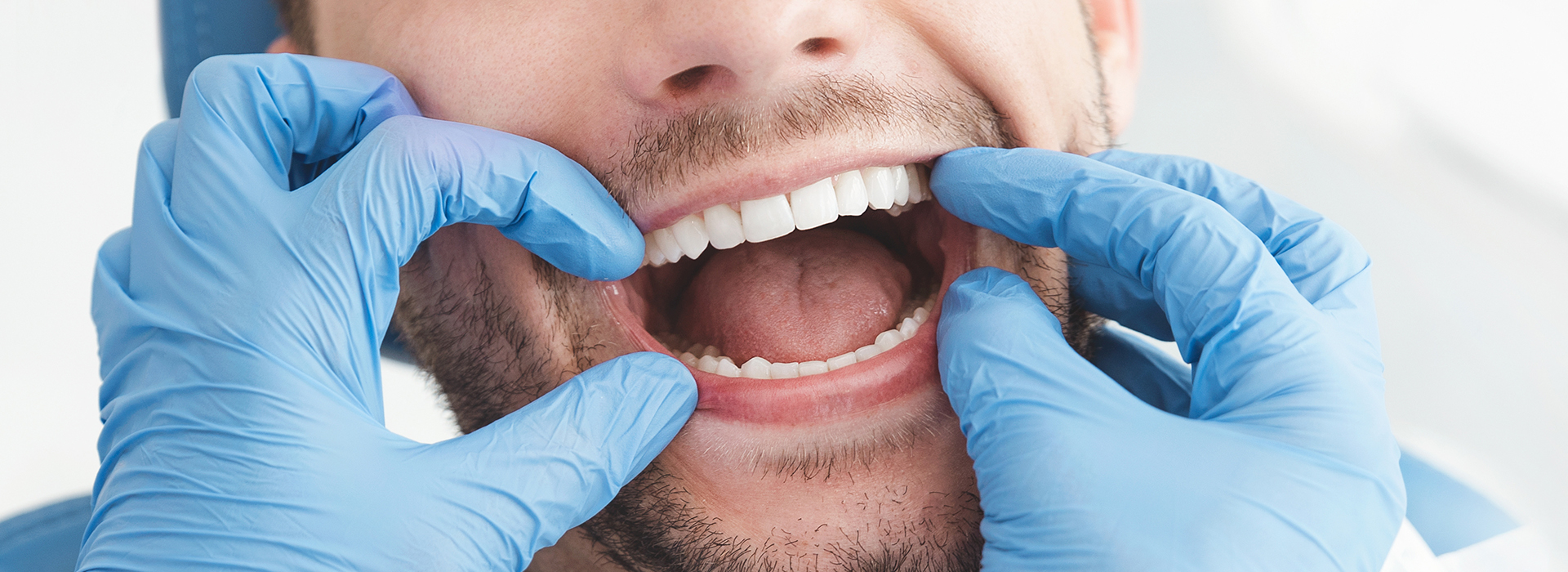General & Cosmetic Dentistry
The office of Keith A. Kye, DDS, FAGD serves the neighborhoods of Huntersville, Lake Norman, Davidson and Cornelius.


At the office of Keith A. Kye, DDS, FAGD, we believe prevention is the smartest way to protect your smile. Regular oral exams give us a clear picture of your current dental health and allow us to catch small issues before they become bigger problems. During an exam, our team combines careful observation, patient history, and targeted diagnostics to build a personalized plan for maintaining and improving oral health for each member of your family.
Your initial appointment sets the tone for your ongoing care. We'll start by reviewing your medical and dental histories, asking about medications, prior dental experiences, and any symptoms you may be experiencing. This conversation helps us identify risk factors—such as dry mouth, certain medications, or medical conditions—that can influence your oral health and guide which exams and tests are most appropriate.
Next, we complete a hands-on clinical exam that covers teeth, gums, tongue, palate, and the supporting bone and soft tissues. We evaluate how your teeth come together (your bite), check for signs of wear from clenching or grinding, and assess the function of the temporomandibular joints. A careful oral cancer screening is included in every comprehensive exam so we can spot unusual lesions or changes early.
Diagnostic images are a common part of a thorough first exam. If needed, we’ll take targeted x-rays to view structures below the surface that can’t be seen with the naked eye. When we combine visual inspection with imaging and patient history, we can make well-informed recommendations about prevention or treatment options tailored to your needs.
Your oral cavity is often a mirror of your general health. During exams we look for signs that may indicate broader medical issues—persistent dry mouth, unusual ulcers, swollen glands, or bleeding gums can all provide clues. Noting these signs early allows us to recommend further evaluation or coordinate care with your medical provider when appropriate.
Research continues to show meaningful links between oral conditions and systemic diseases. Chronic gum inflammation, for example, has been associated with increased risk for conditions such as cardiovascular disease and diabetes. While the relationship is complex, routine dental evaluations help us identify patterns that merit closer attention or collaborative care.
We also take time to review lifestyle factors that affect oral and overall health. Diet, tobacco use, sleep patterns, and stress levels can influence both the mouth and the rest of the body. By discussing these elements during your exam, we can offer practical guidance to support lasting improvements in health.

Keeping your mouth healthy is a partnership. Daily brushing and flossing are essential, but professional exams and cleanings fill in the gaps that at-home care can miss. Plaque and tartar buildup in hard-to-reach areas can harbor bacteria that lead to cavities and gum disease; removing these deposits helps prevent progressive problems and keeps your smile comfortable and functional.
Routine visits also give us a chance to monitor changes over time. Early detection of cavities, gum inflammation, or shifting teeth often lets us treat issues conservatively and successfully. We’ll tailor a maintenance schedule based on your individual risk—many patients benefit from twice-yearly care, while others may need more frequent monitoring.
Professional cleanings do more than freshen your smile—they protect the tissues and structures that support your teeth. After a cleaning, our hygienist will review oral hygiene techniques and recommend practical products or routines that address your specific needs so you can maintain progress between visits.
Children and adolescents especially gain long-term benefits from early, consistent dental care. We watch dental and jaw development as young patients grow, offering preventive treatments and guidance that set the stage for a lifetime of better oral health. When developmental or alignment concerns appear, we’ll discuss appropriate next steps and referrals if orthodontic evaluation is warranted.

While visual inspection is indispensable, many dental issues begin below the surface. Dental x-rays allow us to evaluate tooth roots, bone levels, developing teeth, and areas between teeth that are otherwise hidden. Images help us confirm or rule out problems and guide treatment decisions with greater precision.
Digital radiography has become the standard because it delivers high-quality images with minimal radiation exposure. Digital images appear instantly on a monitor for patient review, can be enhanced for clearer interpretation, and are stored securely in your record for comparison over time. This efficiency helps us explain findings and involve you in thoughtful care planning.
Imaging is always selected based on need and safety. We choose the most focused and conservative imaging approach that will provide the information required for diagnosis and treatment planning. When specialized three-dimensional views are necessary, we may recommend cone-beam computed tomography (CBCT) to evaluate complex anatomy for procedures such as implant planning or advanced surgical cases.
Not every visit requires the same set of images. We select imaging based on the clinical question at hand—whether investigating a suspected cavity, assessing root health, or planning comprehensive treatment. Understanding the typical types of images can help you know what to expect.
Periapical x-ray — Focused on one or a few teeth, this image shows the full length of a tooth from crown to root and the surrounding bone, which is useful for evaluating root health and infections.
Bitewing x-ray — These images capture the crowns of back teeth and are especially useful for detecting early decay between teeth and monitoring bone levels around the teeth.
Full mouth series — A comprehensive set of periapical and bitewing images that provides a detailed look at all teeth and supporting structures when a complete evaluation is needed.
Panoramic film (panorex) — A single wide-view image of the jaws and teeth, helpful for assessing overall development, impacted teeth, and jawbone conditions.
Cephalometric film — A profile view often used in orthodontic assessment to evaluate facial and jaw relationships during growth and treatment planning.
For complex cases that demand a three-dimensional perspective, cone-beam computed tomography (CBCT) provides detailed volumetric images. CBCT can clarify anatomical relationships, reveal hidden pathology, and support precise placement of implants or other surgical procedures. As with all imaging, we weigh the diagnostic benefits against exposure and choose technology judiciously.

At the office of Keith A. Kye, DDS, FAGD, comprehensive oral exams are the foundation of our preventive and restorative care. Each visit is an opportunity to update your oral health plan, address concerns, and empower you with the information and tools to keep your smile healthy. If you have questions or would like more information about our oral exam process, please contact us for assistance.
Yes. We always welcome new patients and their families for care. Feel free to give us a call or reach out to us online to schedule a first visit or for any additional information on our office. We look forward to hearing from you!
Routine dental checkups and professional cleanings help ensure your smile remains in tip-top condition and that any developing problems receive the prompt care they require. While it's a good idea to schedule a checkup and cleaning twice a year, longer or shorter intervals between routine visits depend on your specific needs.
We understand that life gets complicated and busy, and for various reasons, you haven't been able to get to the dentist for care. Don't worry; it's always a good time to get back in touch with the health of your smile.
At Keith A. Kye, DDS, FAGD, we offer skilled and compassionate care to address a wide range of dental needs. Whether you need a simple checkup and cleaning, restorations, periodontal treatment, root canal therapy, or the replacement of missing teeth to get your smile back into shape, we provide precise, gentle, stress-free treatment to give you a smile that is as beautiful as it is healthy.
Give us a call today; we're happy to address all your questions and concerns about getting your smile back in tip-top condition.
For pregnant women, practicing good oral care and seeing the dentist to maintain a healthy smile is considered an important component of prenatal care. Researchers have found that pregnancy not only increases the risk of oral health problems, but these problems may also lead to pregnancy complications. At the office of Keith A. Kye, DDS, FAGD, we provide the skilled and compassionate care required to help expectant mothers keep their teeth and gums in tip-top condition. While certain procedures are not recommended during pregnancy, we provide the necessary care and take all the necessary precautions required.
Thanks to advances in modern dentistry, teeth that have been affected by a range of imperfections or that have sustained damage from trauma or dental decay can be restored to produce a naturally beautiful looking and functional smile.
As skilled and experienced providers of care, our office can effectively improve and enhance the appearance of teeth that are stained, discolored, misshapen, chipped, fractured, gapped, crowded, or broken down due to dental decay. At the office of Keith A. Kye, DDS, FAGD, we offer a comprehensive selection of the leading-edge cosmetic solutions from teeth whitening procedures, dental bonding, tooth-colored fillings, and veneers, to prosthetic solutions and dental implants to rebuild complete and beautiful smiles.
Contact our office to learn more about the many ways we can help you create the smile you've always wanted.
If you're visiting Keith A. Kye, DDS, FAGD for the first time, it is helpful that you contact your former dental office and have your records sent over to us. Make note of any problems you may have so that you can discuss them with your dentist.
To provide efficient service, we ask you to please bring your insurance card, an ID, plus any referral slips or diagnostic records given to you by another office. If you are taking medications, please note or make a list of what they are as you will need to provide that information.
Yes! We assure you that both you and your family will be in good hands at the office of Keith A. Kye, DDS, FAGD.
We do our best to make sure every patient who steps into our office for care is put at ease. We provide precise and gentle care and our skilled, compassionate team strives to make every visit stress-free. You can rest assured that your smile is in the best of hands and that we are doing all we can to ensure your comfort throughout every procedure. While we always take the time to explain every step in care, feel free to ask us any questions about local anesthesia and methods of dental sedation.
At the office of Keith A. Kye, DDS, FAGD, we strive to provide the highest quality of care to address all your dental needs. Once we've had the opportunity to examine your smile, we can give you a clear picture of any dental issues that are present, along with a quote for what the cost of treatment will be. The cost of care all depends upon the extent and complexity of issues affecting the health or appearance of your smile and the types of procedures that are required. Our goal is to make dental care more affordable so that you can begin treatment without any additional stress or delay.
Keep in mind that with routine dental checkups and periodic care, we can help prevent dental disease while treating emerging problems early in their onset to avoid larger issues and more expensive care down the road.
Routine dental checkups and preventive care procedures may be covered under your dental insurance plan requiring little to no out-of-pocket expense. We invite you to check our financial information page or give us a call to find out if our office participates with your plan, and if you have any other questions about dental insurance, dental savings plans, forms of payment, or financing options. We welcome your inquiries and do our best to help you begin care without additional stress or delay.
If you've lost a tooth due to injury, decay, gum disease, or any other reason, we recommend dental implants to replace missing teeth. Dental implants come the closest to replicating the look, feel, and function of your natural teeth.
Absolutely! Both flossing and brushing regularly are equally important to maintain your oral health. While brushing cleans the surface of your teeth, flossing cleans in between them. Flossing is important to prevent plaque buildup, which can cause gums to recede and lead to periodontal disease.
Even if you have dentures, it is still necessary to see a dentist! Dental checkups help ensure that your dentures are comfortable, fitting properly, and that there are no other problems. Beyond assessing your dentures, our dentist will also perform a thorough examination of the jawbone, and surrounding soft tissues both inside the mouth, the face, and neck, to confirm that you remain in good oral health.
Emergency dental care is a service we hope you'll never need- but if you do, the office of Keith A. Kye, DDS, FAGD is here for you!
Whether you're suffering from a chipped tooth, toothache, or any problem affecting your oral health, you can be sure to get the prompt attention and compassionate care you require at our office. Patient care and comfort are our top priorities, and we offer a comprehensive range of the most advanced services to address a broad spectrum of dental needs.
While the pain of a toothache is one of the more common reasons that patients come to our office for emergency dental care, we also promptly treat emergencies that are not necessarily painful like crowns that have been dislodged and broken dentures that leave embarrassing gaps in one's smile.
You can rest assured that your oral health is in the best of hands at our office. We'll quickly determine exactly what's wrong, explain your treatment options, and then provide the precise and gentle care you require to alleviate your discomfort and get you back on the path to oral health and wellness.
Your health and comfort are our top priorities. If your dental emergency is painful, if it affects the appearance of your smile, or if you suspect that an infection is present, our office will make every effort to see you as soon as possible for care.
At the office of Keith A. Kye, DDS, FAGD, we welcome patients of all ages for care and offer a comprehensive range of services designed to help every member of your family maintain a beautiful and healthy smile. Whether you or a loved one needs a routine checkup and cleaning, fillings, same-day crowns, a cosmetic smile makeover, the replacement of missing teeth or require the services of a skilled and compassionate emergency dentist, you can rely on our office for the highest quality care.
For more information on our office and the many services we provide, or to schedule an appointment for care, give us a call today.
During an oral exam your dental team reviews your medical and dental history and asks about any symptoms or concerns you may have. The clinician performs a hands-on inspection of the teeth, gums, tongue, palate and other soft tissues while evaluating how your teeth come together and how the jaws function. A careful oral cancer screening is included with the visual exam to identify unusual lesions or tissue changes early.
If indicated, targeted diagnostic images are taken to view areas that cannot be seen with the naked eye and to confirm clinical findings. The information gathered is combined to develop a personalized plan focused on prevention, monitoring or conservative treatment. Communication about findings and next steps is an important part of the visit so you leave with a clear understanding of your oral health.
Frequency of oral exams is individualized based on your risk factors, current oral health and medical history rather than a one-size-fits-all rule. Many patients benefit from twice-yearly exams and cleanings to maintain gum health and catch early decay, while others with certain conditions may need more frequent monitoring. Your dentist will explain the reasons behind their recommendation and adjust the schedule as your needs change.
Risk factors that influence interval include a history of gum disease, a high rate of cavities, medical conditions that affect saliva or immunity, and habits such as tobacco use or clenching. Regular follow-up allows us to track changes over time and intervene early when necessary, which often keeps care more conservative and effective. By partnering on a maintenance rhythm that fits your situation, you can better protect long-term oral health.
At your first appointment bring a list of current medications, recent medical diagnoses and any dental records you may have from previous providers. Be prepared to discuss symptoms such as sensitivity, pain, dry mouth or changes you have noticed, as well as your daily oral hygiene routine and dietary habits. Honest information about tobacco, alcohol and sleep patterns helps the clinician assess risk and recommend appropriate preventive measures.
Also let the team know about any anxiety, special needs or previous dental experiences that might affect your visit so staff can make accommodations and explain procedures clearly. Sharing this background helps prioritize diagnostics, tailor the exam and create a comfortable, individualized plan for care. Clear communication at the outset supports better long-term outcomes and trust between you and your dental team.
Oral cancer screening is an integral part of a comprehensive exam and involves a systematic inspection and palpation of the lips, oral mucosa, tongue, floor of mouth, palate and neck. The clinician looks for persistent sores, lumps, red or white patches and areas of unusual texture or firmness that could signal a problem. Any suspicious findings are documented and monitored or referred for further evaluation, often with a biopsy when indicated.
Early detection greatly improves treatment options and outcomes, so routine screening is emphasized for all adult patients and especially for those with risk factors like tobacco or heavy alcohol use. When needed, adjunctive tools or imaging may help clarify uncertain areas, and the dental team will coordinate referrals to specialists to ensure timely follow-up. Open communication about new symptoms between scheduled visits is important to catch changes promptly.
Dental x-rays reveal structures that cannot be seen during a visual exam, including tooth roots, bone levels, developing teeth and decay between teeth. The type and frequency of imaging are selected based on the clinical question at hand so the smallest, most focused exposure is used to obtain the necessary information. Digital radiography provides high-quality images with minimal radiation and allows immediate review to help explain findings.
Common images include periapical and bitewing films for targeted assessment, panoramic images for broad evaluation and, when clinically warranted, three-dimensional cone-beam CT for complex anatomy or implant planning. Imaging helps confirm diagnoses, guide conservative treatment and monitor changes over time by comparing new images to prior records. Your dentist will discuss why a particular image is recommended and how it informs your care plan.
The oral cavity often offers visible clues to systemic health, so a thorough exam can suggest conditions that merit medical attention. Signs such as persistent dry mouth, swollen lymph nodes, unexplained ulcers or unusual oral pigmentation may indicate underlying medical issues or medication side effects that require coordination with your physician. Noting these findings early allows the dental team to recommend timely medical follow-up when appropriate.
Research shows links between chronic oral inflammation and systemic conditions like diabetes and cardiovascular disease, though the relationships are complex and multifactorial. Regular dental evaluations help identify patterns that could affect overall health and support collaborative care between dental and medical providers. When necessary, we will communicate findings and concerns so you receive comprehensive support for both oral and general well-being.
Assessment for bite issues, temporomandibular joint function and signs of bruxism begins with a clinical evaluation of jaw movement, bite alignment and wear patterns on the teeth. The clinician observes how your teeth come together, listens for joint noises, checks muscle tenderness and looks for enamel wear, fractures or flattened surfaces that suggest clenching or grinding. These findings help determine whether conservative measures, monitoring or referral to a specialist are appropriate.
When indicated, occlusal analysis, photographic records or diagnostic models may be used to better understand the relationship between bite forces and tooth wear. Management often starts with noninvasive strategies such as night guards, habit modification and targeted restorations to restore function and protect teeth. Follow-up exams track response to therapy and allow adjustments to minimize further damage and improve comfort.
After an exam the dental team will outline preventive strategies tailored to your risk profile, which can include professional cleanings, topical fluoride, sealants or targeted home-care recommendations. Instruction on brushing and flossing techniques, product suggestions and dietary guidance are common components of a personalized prevention plan. The goal is to reduce plaque accumulation, lower the risk of decay and maintain periodontal health between visits.
For patients with specific risks, more frequent monitoring or adjunctive therapies may be recommended to prevent progression of disease. Education about lifestyle factors such as tobacco cessation, nutrition and sleep can further support oral and overall health. Regular reassessment allows the team to refine preventive measures as your needs evolve.
Yes, exams for younger patients prioritize growth and development, monitoring tooth eruption patterns, jaw growth and early signs of alignment concerns. The clinician evaluates primary and permanent teeth, checks for decay, assesses bite relationships and discusses habits such as thumb-sucking or pacifier use that can affect development. Preventive interventions like sealants and fluoride treatments are considered based on age and individual risk.
Early and consistent dental visits also present opportunities to teach proper oral hygiene and reduce dental anxiety through positive experiences. When developmental or orthodontic issues are identified, the dental team will explain timing and possible referrals for orthodontic evaluation so treatment can be coordinated effectively. Establishing a preventive foundation in childhood supports healthier outcomes across a lifetime.
After your exam you will receive an explanation of findings, recommended next steps and a personalized schedule for follow-up care based on your needs. Recommendations may range from a routine cleaning and home-care adjustments to more detailed diagnostics or restorative treatment when clinically necessary. The dental team will prioritize interventions that preserve healthy tissue and aim to minimize invasive procedures by addressing issues early.
When further treatment or monitoring is needed, the office staff will help coordinate appointments and provide instructions for interim care, such as pain management or special oral hygiene techniques. If a referral is appropriate, the dental team will communicate with the specialist to ensure continuity of care. Clear follow-up planning helps patients stay informed and engaged in maintaining long-term oral health at the office of Keith A. Kye, DDS, FAGD.

The office of Keith A. Kye, DDS, FAGD serves the neighborhoods of Huntersville, Lake Norman, Davidson and Cornelius.